
Do you know your left from your right in Portuguese? Asking for directions can mean the difference between a heavenly day on the beach and a horrible day on your feet, hot and bothered and wondering how to even get back to the hotel. Believe me – I know! On my earlier travels, I didn’t even know simple terms like ‘go straight ahead’ or ‘go west,’ and I was always too shy to ask locals for directions. It wasn’t my ego, but rather the language barrier that held me back. I’ve ended up in some pretty dodgy situations for my lack of directional word skills.
This never needs to happen! When traveling in Brazil, you should step out in confidence, ready to work your Portuguese magic and have a full day of exploring. It’s about knowing a few basic phrases and then tailoring them with the right directional words for each situation. Do you need to be pointed south in Portuguese? Just ask! Believe me, people are more willing to help than you might think. It’s when you ask in English that locals might feel too uncertain to answer you. After all, they don’t want to get you lost. For this reason, it also makes sense that you learn how to understand people’s responses.
Asking directions in Brazil is inevitable. So, learn to love it! Our job here at PortuguesePod101 is to give you the confidence you need to fully immerse and be the intrepid adventurer you are.
 Table of Contents
Table of Contents
1. Talking about position and direction in Portuguese
Have you ever tried saying the compass directions of north, south, east and west in Portuguese? These words are good to know, being the most natural and ancient method of finding direction. In the days before GPS – before the invention of the compass, even – knowing the cardinal directions was critical to finding the way. Certainly, if you were lost somewhere in the mountain regions now and using a map to navigate, you’d find them useful. Even more so if you and a Brazilian friend were adrift at sea, following the stars!
In most situations, though, we rely on body relative directions – your basic up, down, left and right, forward and backwards. Most cultures use relative directions for reference and Portuguese is no exception. Interestingly, in a few old languages there are no words for left and right and people still rely on cardinal directions every day. Can you imagine having such a compass brain?
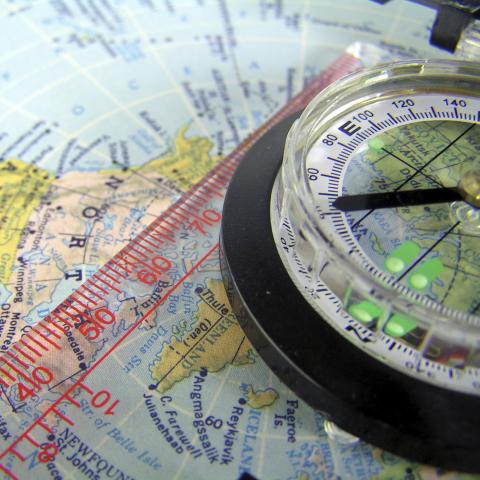
Well, scientists say that all mammals have an innate sense of direction, so getting good at finding your way is just a matter of practice. It’s pretty cool to think that we were born already pre-wired to grasp directions; the descriptive words we invented are mere labels to communicate these directions to others! Thus, the need to learn some Portuguese positional vocabulary. So, without further ado… let’s dive in.
1- Top – topo
If planting a flag at the top of the highest mountain in Brazil is a goal you’d rather leave for adrenaline junkies, how about making it to the top of the highest building? Your view of the city will be one you’ll never forget, and you can take a selfie for Twitter with your head in the clouds.

2- Bottom – fundo
The ‘bottom’ can refer to the lower end of a road, the foot of a mountain, or the ground floor of a building. It’s the place you head for after you’ve been to the top!
What are your favorite ‘bottoms’? I love the first rung of a ladder, the base of a huge tree or the bottom of a jungle-covered hill. What can I say? I’m a climber. Divers like the bottom of the ocean and foxes like the bottom of a hole. Since you’re learning Portuguese, hopefully you’ll travel from the top to the bottom of Brazil.
3- Up – cima
This is a very common and useful word to know when seeking directions. You can go up the street, up an elevator, up a cableway, up a mountain… even up into the sky in a hot air balloon. It all depends on how far up you like to be!

4- Down – baixo
What goes up, must surely come down. This is true of airplanes, flaming arrows and grasshoppers – either aeronautics or gravity will take care of that. In the case of traveling humans who don’t wish to go down at terminal velocity, it’s useful to know phrases such as, “Excuse me, where is the path leading back down this mountain?”
5- Middle – meio
In Lord of the Rings, Tolkien’s characters live in Middle-earth, which is just an ancient word for the inhabited world of men; it referred to the physical world, as opposed to the unseen worlds above and below it. The ancients also thought of the human world as vaguely in the middle of the encircling seas.
When we talk about the ‘middle’, we’re referring to a point that’s roughly between two horizontal lines – like the middle of the road or the middle of a river. While you’re unlikely to ask for directions to the ‘middle’ of anything, you might hear it as a response. For example, “You’re looking for the castle ruins? But they’re in the middle of the forest!”
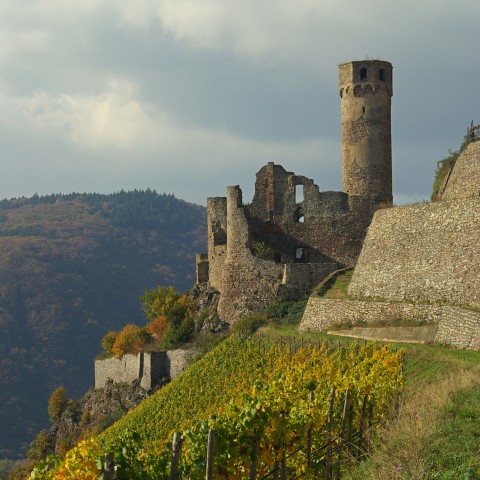
6- Center – centro
Although similar in meaning to ‘middle’, this word is more specific. Technically, it means the exact central point of a circular area, equally distant from every point on the circumference. When asking for directions to the center of town, though, we don’t mean to find a mathematically-accurate pinpoint!

7- Front – frente
The front is the place or position that is seen first; it’s the most forward part of something. In the case of a hotel, the front is going to be easy to recognize, so if you call a taxi and are told to wait “in front of the hotel”, you won’t have a problem. It’s pretty cool how just knowing the main Portuguese directional words can help you locate something if there’s a good landmark nearby.
8- Back – atrás
I once rented a house in a charming little street that was tucked away at the back of a popular mall. It was so easy to find, but my boss took three hours to locate it from 300 meters away. Why? Well, because she spoke no English and I had no clue what the word for ‘back’ was. All she heard, no matter which way I said it, was “mall, mall, mall”. As a result, she hunted in front of and next to the mall until she was frazzled.
Knowing how to describe the location of your own residence is probably the first Portuguese ‘directions’ you should practice. This skill will certainly come in handy if you’re lost and looking for your way home.
9- Side – lado
If the place you’re looking for is at the ‘side’ of something, it will be located to the left or the right of that landmark. That could mean you’re looking for an alleyway beside a building, or a second entrance (as opposed to the main entrance).
As an example, you might be told that your tour bus will be waiting at the right side of the building, not in front. Of course, then you’ll also need to understand “It’s on the right” in Portuguese.
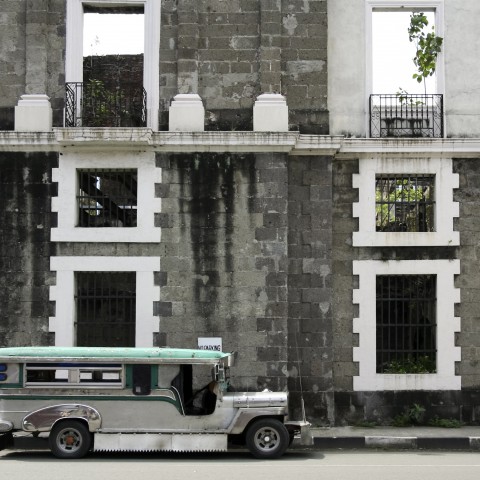
10- East – leste
If you’re facing north, then east is the direction of your right hand. It’s the direction toward which the Earth rotates about its axis, and therefore the general direction from which the sun appears to rise. If you want to go east using a compass for navigation, you should set a bearing of 90°.
We think of Asia as the ‘East’. Geographically, this part of the world lies in the eastern hemisphere, but there’s so much more that we’ve come to associate with this word. The East signifies ancient knowledge and is symbolic of enlightenment in many cultures.

11- West – oeste
West is the opposite to east and it’s the direction in which the sun sets. To go west using a compass, you’ll set a bearing of 270 degrees.
If you were on the planet Venus, which rotates in the opposite direction from the Earth (retrograde rotation), the Sun would rise in the west and set in the east… not that you’d be able to see the sun through Venus’s opaque clouds.
Culturally, the West refers mainly to the Americas and Europe, but also to Australia and New Zealand, which are geographically in the East. The Western way of thinking is very different to that of the East. One of the most striking differences is individualism versus collectivism. In the West, we grew up with philosophies of freedom and independence, whereas in the East concepts of unity are more important.
Food for thought: as a traveler who’s invested in learning the languages and cultures of places you visit, you have an opportunity to become a wonderfully balanced thinker – something the world needs more of.
12- North – norte
North is the top point of a map and when navigating, you’d set a compass bearing of 360 degrees if you want to go that way. Globes of the earth have the north pole at the top, and we use north as the direction by which we define all other directions.
If you look into the night sky, the North Star (Polaris) marks the way due north. It’s an amazing star, in that it holds nearly still in our sky while the entire northern sky moves around it. That’s because it’s located nearly at the north celestial pole – the point around which the entire northern sky turns. Definitely a boon for lost travelers!

13- South – sul
South is the opposite of north, and it’s perpendicular to the east and west. You can find it with a compass if you set your bearings to 180 degrees.
The south celestial pole is the point around which the entire southern sky appears to turn. In the night sky of the southern hemisphere, the Southern Cross is a very easy to find constellation with four points in the shape of a diamond. If you come from the southern hemisphere, chances are your dad or mum pointed it out to you when you were a kid. You can use the Southern Cross to find south if traveling by night, so it’s well worth figuring it out!
14- Outside – fora
This word refers to any place that is not under a roof. Perhaps you’ve heard talk about some amazing local bands that will be playing in a nearby town on the weekend. If it’s all happening outside, you’ll be looking for a venue in a park, a stadium or some other big open space. Come rain or shine, outside definitely works for me!

15- Inside – dentro
I can tolerate being inside if all the windows are open, or if I’m watching the latest Homeland episode. How about you? I suppose going shopping for Brazilian-style accessories would be pretty fun, too, and that will (mostly) be an inside affair.
16- Opposite – oposto
This is a great word to use as a reference point for locating a place. It’s right opposite that other place! In other words, if you stand with your back to the given landmark, your destination will be right in front of you.
17- Adjacent – próximo
So, the adorable old man from next door, who looks about ninety-nine, explains in Portuguese that the food market where he works is adjacent to the community hall on the main road. ‘Adjacent’ just means next to or adjoining something else, so… head for the hall!
While you’re marveling at the wondrous and colorful displays of Brazilian food, think about how all of these delicious stalls lie adjacent to one another. Having a happy visual association with a new word is a proven way to remember it!
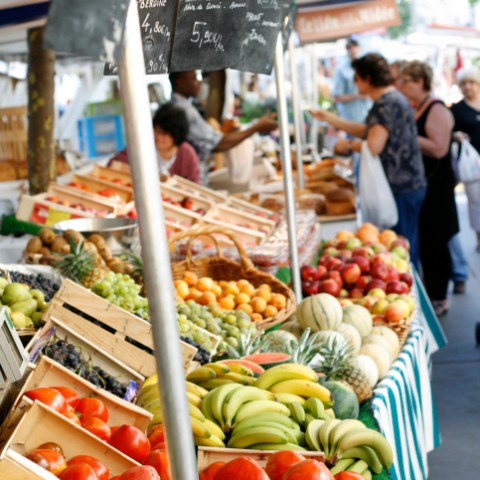
18- Toward – em direção a
To go toward something is to go in its direction and get closer to it. This word can often appear in a sentence with ‘straight ahead’, as in:
“Go straight ahead, toward the park.”
If you’ve come to Brazil to teach English, you might have to ask someone how to find your new school. Depending on what town you’re in, you could simply head toward the residential area at lunch time. You’ll see (and probably hear) the primary school soon enough – it will be the big fenced building with all the kids running around the yard!
19- Facing – de frente para
If you look at yourself in a mirror, you’ll be facing your reflection. In other words: you and your reflection look directly at each other. Many plush hotels are ocean-facing or river-facing, meaning the main entrance is pointed directly at the water, and the beach out front faces the hotel.
20- Beside – ao lado
I know of a special little place where there’s a gym right beside a river. You can watch the sun go down over the water while working out – it’s amazing. What’s more, you can park your scooter beside the building and it will still be there when you come out.
21- Corner – esquina
I love a corner when it comes to directions. A street corner is where two roads meet at an angle – often 90 degrees – making it easier to find than a location on a straight plane.
“Which building is the piano teacher in, sir?”
“Oh, that’s easy – it’s the one on the corner.”
The key to a corner is that it leads in two directions. It could form a crossroads, a huge intersection, or it could be the start of a tiny one-way cobblestone street with hidden treasures waiting in the shadow of the buildings.
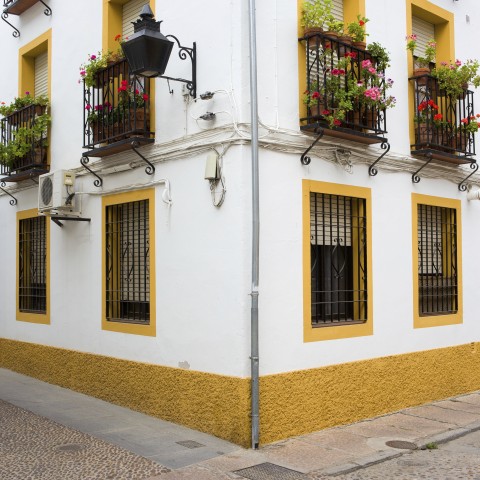
22- Distant – distante
When a location is distant, it’s in an outlying area. This Portuguese word refers to the remoteness of the site, not to how long it takes to get there. For that reason, it’s a very good idea to write the directions down, rather than try to memorize them in Portuguese. Even better, get a Brazilian person to write them down for you. This may seem obvious, but always include the location of your starting point! Any directions you’re given will be relative to the exact place you’re starting from.

23- Far – longe
This word has a similar meaning to the previous one, but it speaks more about the fact that it will take some time to get there. If you’re told that your destination is “far”, you’ll no doubt want to go by public transport if you don’t have your own vehicle. Get your hands on a road map and have the directions explained to you using this map. Don’t hesitate to bring out the highlighters.
24- Close – perto
This word is always a good one to hear when you have your heart set on a very relaxing day in the sun. It means there’s only a short distance to travel, so you can get there in a heartbeat and let the tanning commence. Remember to grab your Nook Book – learning is enhanced when you’re feeling happy and unencumbered. Being close to ‘home’ also means you can safely steal maximum lazy hours and leave the short return trip for sunset!

25- By – por
This word identifies the position of a physical object beside another object or a place. A Bed and Breakfast can be ‘by the sea’ if it’s in close proximity to the sea.
‘By’ can also be used to describe the best mode of transport for your route, as in:
“You can get there by bus.”
26- Surrounding – rodeado
If something is surrounding you, it is on every side and you are enclosed by it – kind of like being in a boat. Of course, we’re not talking about deep water here, unless you’re planning on going fishing. Directions that include this word are more likely to refer to the surrounding countryside, or any other features that are all around the place you’re looking for.

27- All sides – todos os lados
Another useful descriptive Portuguese term to know is ‘all sides’. It simply means that from a particular point, you will be able to see the same features to the front, back and sides of you. It doesn’t necessarily imply you’ll be completely surrounded, just more-or-less so. Say, for example, you’re visiting the winelands for the day. When you get there, you’ll see vineyards on all sides of you. How stunning! Don’t neglect to sample the local wines – obviously.
28- Next to – perto de
The person giving you directions is probably standing next to you. The place being described as ‘next to’ something is in a position immediately to one side of it. It could refer to adjoining buildings, neighbouring stores, or the one-legged beggar who sits next to the beautiful flower vendor on weekdays. ‘Next to’ is a great positional term, as everything is next to something!
“Excuse me, Ma’am. Where is the train station?”
“It’s that way – next to the tourist market.”
29- Above – acima
This is the direction you’ll be looking at if you turn your head upwards. Relative to where your body is, it’s a point higher than your head. If you’re looking for the location of a place that’s ‘above’ something, it’s likely to be on at least the first floor of a building; in other words, above another floor.
‘Above’ could also refer to something that will be visible overhead when you get to the right place. For example, the road you’re looking for might have holiday decorations strung up from pole to pole above it. In the cities, this is very likely if there’s any kind of festival going on.

30- Under – embaixo
Under is the opposite of above, and refers to a place that lies beneath something else. In the case of directions in Portuguese, it could refer to going under a bridge – always a great landmark – or perhaps through a subway. In some parts of the world, you can even travel through a tunnel that’s under the sea!
Of course, you might just be missing your home brew and looking for an awesome coffee shop that happens to be under the very cool local gym you were also looking for. Nice find!
2. Getting directions in Portuguese
The quickest and easiest way to find out how to get where you’re going is simply to ask someone. Most people on the streets of Brazil won’t mind being asked at all and will actually appreciate your attempt to ask directions in Portuguese. After all, most tourists are more inclined to ask in their own language and hope for the best. How pedestrian is that, though?

I know, I know – you normally prefer to find your own way without asking. Well, think of it like this: you obviously need to practice asking questions in Portuguese as much as you need to practice small talk, counting, or ordering a beer. Since you can’t very well ask a complete stranger if they would please help you count to five hundred, you’ll have to stick with asking directions!
We spoke earlier about body relative directions and these tend to be the ones we use most. For example:
“Turn left.”
“Go straight.”
“Turn right.”
Remember, too, that your approach is important. Many people are wary of strangers and you don’t want to scare them off. It’s best to be friendly, direct and get to the point quickly. A simple ‘Hi, can you help me?” or “Excuse me, I’m a bit lost,” will suffice. If you have a map in your hand, even better, as your intentions will be clear.
The bottom line is that if you want to find your way around Brazil with ease, it’s a good idea to master these basic phrases. With a little practice, you can also learn how to say directions in Portuguese. Before you know it, you’ll be the one explaining the way!
3. Conclusion
Now that you have over thirty new directional phrases you can learn in Portuguese, there’s no need to fear losing your way when you hit the streets of Brazil. All you need is a polite approach and your own amazing smile, and the locals will be excited to help you. It’s a chance for them to get better at explaining things to a foreigner, too. Most will enjoy that!
I advise keeping a few things handy in your day pack: a street map, a highlighter, a small notebook and pen, and your Portuguese phrasebook. It would be useful to also have the Portuguese WordPower app installed on your phone – available for both iPhone and Android.
Here’s a quick challenge to get you using the new terms right away. Can you translate these directions into Portuguese?
“It’s close. Go straight ahead to the top of the hill and turn left at the corner. The building is on the right, opposite a small bus stop.”
You’re doing amazingly well to have come this far! Well done on tackling the essential topic of ‘directions’ – it’s a brave challenge that will be immensely rewarding. Trust me, when you’re standing at a beautiful location that you found just by knowing what to ask in Portuguese, you’re going to feel pretty darn good.
If you’re as excited as I am about taking Portuguese to an even deeper level, we have so much more to offer you. Did you know that we’ve already had over 1 billion lesson downloads? I know – we’re blown away by that, too. It’s amazing to be bringing the world’s languages to people who are so hungry for learning. Let me share some of our best options for you:
- If you haven’t done so already, grab your free lifetime account as a start. You’ll get audio and video lessons, plus vocabulary building tools.
- My favorite freebie is the word of the day, which will arrive in your inbox every morning. Those are the words I remember best!
- Start listening to Portuguese music. I’m serious – it really works to make the resistant parts of the brain relax and accept the new language. Read about it here for some tips.
- If you enjoy reading, we have some great iBooks for your daily commute.
- If you have a Kindle and prefer to do your reading on a picnic blanket, there are over 6 hours of unique lessons in Portuguese for you right there.
That’s it for today! Join PortuguesePod101 to discover many more ways that we can offer you a truly fun and enriching language learning experience. Happy travels!





































































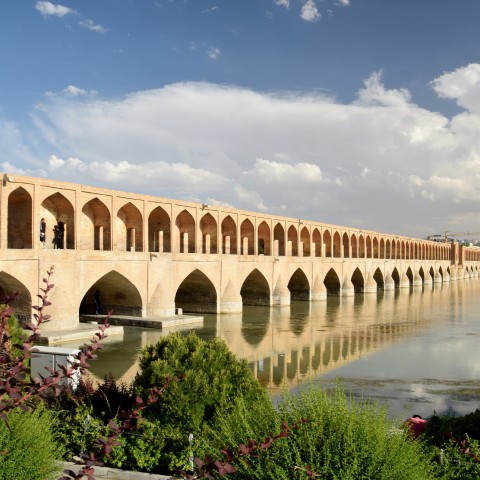













 Table of Contents
Table of Contents



















